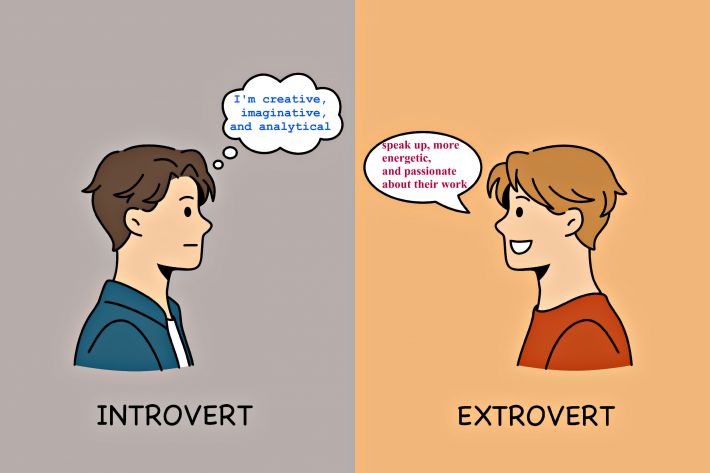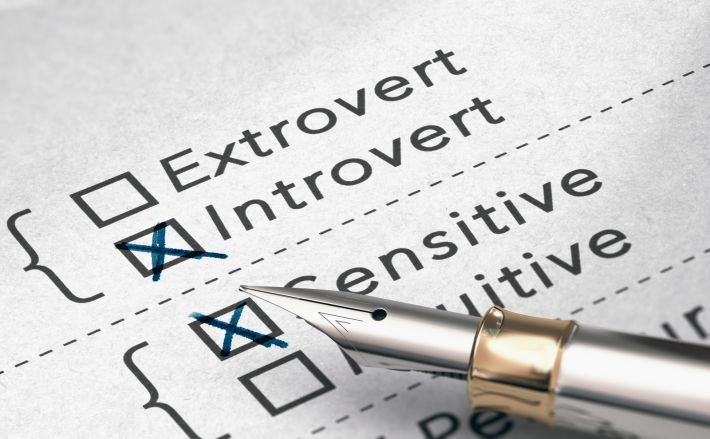- in Personality by Tony
- |
- 1 comments
What’s the Difference Between Introverts and Extroverts?

Extroverts and introverts are two types of people who generally prefer different activities, environments, and work styles. Extroverts tend to be more social and enjoy being around other people, and they seek stimulation from their environment and thrive on new experiences.
More...
They may appear to be having fun, but they’re likely just doing it for you. Introverts are the opposite. They generally don’t enjoy being around many people or doing activities requiring attention from others.
Instead, they prefer to spend time alone to recharge their batteries and think more abstractly. However, that doesn’t mean that extroverts are incapable of understanding the needs of an introvert or vice versa.
In fact, most extroverts are comfortable spending time alone as well. Here is an overview of the differences between an extrovert and an introvert so that you can better understand your friends or family members who may seem like they dislike being around others or who don’t seem like they enjoy your company.

Introversion and extroversion are clarified
Introversion is the tendency to prefer spending time alone and can be an influential part of one’s personality. It’s characterised by a preference for solitude and reflection over social interaction.
Someone introverted will likely avoid parties, large gatherings, or other situations in which they would have to engage with lots of people. On the other hand, extroversion is the tendency to seek out social interaction and stimulation to feel comfortable.
Extroverted people enjoy being around others and even thrive in many social situations. They also tend to talk more regularly than someone introverted. Extroverts typically enjoy getting together with friends and can sometimes be found at parties or other gatherings without any real sense of awkwardness or discomfort.
As you might have guessed, extroverts are always looking for new people or experiences, whereas introverts are often content with their own company or want some peace and quiet time away from it all. However, there’s still a lot of overlap between these two personality types regarding how they spend their free time!
Extroverted people are almost always willing to talk about themselves and their thoughts on various issues, especially topics that interest them. Conversely, introverts may have a more demanding time talking about themselves or very rarely do so unless they’re under close observation in social settings where they usually wouldn’t feel comfortable doing so, for example, when asked questions like “What do you".
Introverts and Extroverts Together: Why They’re Different?
Introverts and extroverts are two different types of personalities. They do not always see eye to eye on things, but they can cooperate when necessary. If you’re trying to communicate with an introvert, it’s best to break the conversation into smaller segments so that the introvert can process what you’re saying.
That is, unless they’re very well-adjusted and socialised. In general, extroverts don’t feel like they need to be around people all the time to have a good time. They thrive off of new experiences without being distracted by their surroundings. They also tend to do things for other people, as it’s more fun that way than if they were doing it themselves.
Introverts typically feel like they need time alone to think more clearly or recharge their batteries before engaging with others again. Because of this, they might not respond well if someone tries to make them come out of their comfort zone quickly or if someone tries to force them into social situations where they don’t want to be.
It’s important not to push an introvert too hard because that will make them feel like you’re trying to manipulate them into doing something that doesn’t fit who they are or what makes them happy.

What are the strengths of introverts?
Extroverts are more likely to speak up in a group setting, be energetic, and be passionate about their work. They’re also more likely to enjoy spontaneous activities like attending the theatre or holiday.
Introverts are more likely to focus on their thoughts and ideas, care for themselves privately, and be comfortable alone. They might not get as excited about activities that don’t require a lot of social interaction or energy.
Differences in how people think

Introverts tend to think more abstractly and independently. They tend to focus on deep, personal thoughts and are generally not interested in the day-to-day happenings of others.
Extroverts are more likely to be social and seek stimulation from their environment. While they may enjoy the company of others, they also need alone time to decompress. Introverts are often more difficult for extroverts to understand because they tend not to want to engage in conversation or do things with other people.
However, introverted extroverts will often try to understand their introverted friends by looking into why they need alone time and what activities give them the most pleasure. The key is understanding that while an extrovert needs a lot of outside stimulation, an introvert needs just the opposite.
But beyond the differences in how people think, there are significant differences in how people act regarding relationships. Introverts generally prefer your limited interaction with other people and like being around small groups of close friends who don’t require much attention from them (if any at all).
They like quiet environments with low-key actions where interactions are few and far between but meaningful/important ones when they happen.
Extroverts have a different take on relationships as well. They believe that relationships require constant contact with other people, whether through spending time together or constantly talking about events in life. Extrovert relationships typically require very little space for solitude.
Conclusion

The term introvert is often used to describe people who are shy, quiet or reserved. They may prefer spending time alone with their thoughts or reading a book rather than socialising.
Extrovert – someone who enjoys being around other people and likes to talk about themselves.
Extroverts tend to be more outgoing, sociable and gregarious. They enjoy meeting new people and talking to others. They can become easily bored if left to their own devices.
Introversion and extroversion are natural personality traits that can’t be changed. They’re just how you feel most of the time. But understanding each type can help you find better ways to communicate with each other.
Introverts are more sensitive, quiet, and easily bored. They get their energy from reflection, deep thought, and solitude. Extroverts are more talkative, energetic and outgoing. They get their energy from activity and interaction.
If introverted, you might feel drained when you go to a party or a loud event. If you are extroverted, you might find yourself feeling excited when surrounded by a lot of people.
Introverts may have difficulty connecting with others or showing emotion in public. Extroverts may have trouble focusing or remembering what they should do at work. Introverts might need an extra dose of alone time to recharge their batteries, but Extroverts may need more quiet time to recharge their batteries.
There is some evidence that extroverts are more prone to depression than introverts. A study published in the British Medical Journal found that extroverted men were twice as likely to develop depression as introverted men.
Another study found that extroverted women were three times more likely to experience depression than introverted women.
However, it has been suggests that extroverts may use positive coping strategies such as seeking social support when facing difficult circumstances.
Nevertheless, there is little research into how personality traits affect the effectiveness of treatments for depression. Different treatment approaches may work better for different personalities.
For example, it has been suggested that cognitive behavioural therapy (CBT) works best for extroverts because it focuses on changing negative thinking patterns. On the other hand, interpersonal psychotherapy (IPT), which involves working through problems with friends and family, might be more effective for introverts.


[…] For instance, someone who tends to be more introverted than extroverted but takes a job as a teacher or salesperson will adapt to behave in a more extroverted way for work. With adaptability, they can surely do this. Yet, they may find their work roles more tiring than a naturally extroverted person. […]